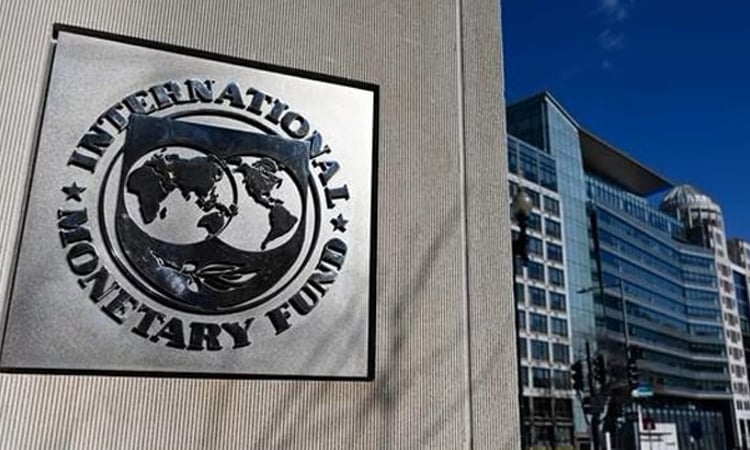News Flash
News Flash

DHAKA, Nov 13, 2025 (BSS) - The International Monetary Fund (IMF) today observed that Bangladesh authorities have made progress in maintaining macroeconomic stability and advancing reforms.
“The authorities have made notable progress in maintaining macroeconomic stability. To ease external imbalances and contain inflation, the authorities tightened both fiscal and monetary policies.
Importantly, foreign exchange reserves have begun to rebuild following the exchange rate reform launched in May,” said Chris Papageorgiou, IMF mission chief, at a virtual press conference.
An IMF mission team led by Chris Papageorgiou visited in the city during October 29–November 13, 2025 to discuss economic and financial policies in the context of the 2025 Article IV consultation and the fifth review of the IMF’s Extended Credit Facility (ECF), Extended Fund Facility (EFF), and Resilience and Sustainability Facility (RSF).
In his speech, Papageorgiou said headline inflation fell from double-digit levels in early FY2025 but remained elevated at 8.2 percent (y-o-y) in October.
However, he said, the economy continues to face significant macro-financial challenges stemming from weak tax revenue and undercapitalization in the financial sector.
“Addressing these challenges will require reforming the tax system to build a simple and fairer taxation environment and tackling financial sector vulnerabilities. With steadfast implementation of these policies, GDP growth is projected to accelerate to nearly 5 percent in FY26 and FY27. Inflation is projected to remain elevated at 8.8 percent in FY26 before declining to 5.5 percent in FY27. However, downside risks to the outlook remain significant. Delayed or inadequate policy action in addressing fiscal and banking challenges would weaken growth, raise inflation, and increase risks to macro-financial stability,” he added.
He said ambitious tax reform in the near term is vital to generate sufficient revenues which are necessary for higher social spending and infrastructure investment; and to lay the foundations for a robust financial system that can help deliver sustainable economic growth.
“Potential options include eliminating reduced VAT rates and removing exemptions—except for essential goods and services—and increasing the minimum turnover tax rate for all corporations. These reforms would need to be complemented by continuous efforts to strengthen tax administration.
Improving public financial and investment management and containing subsidies to a fiscally sustainable level will further support the reallocation of resources, including to broaden social safety net coverage. The reforms could also provide the government with much needed fiscal space to support the financial sector,” he added.
He stated, “Financial sector reforms are critical to address banking sector challenges. A credible government-wide strategy to comprehensively address weak banks should include estimates of system-wide undercapitalization, the scope of fiscal support, and legally robust restructuring and resolution options with identified funding sources.”
“ Asset Quality Reviews need to be expanded to all systemically important and state-owned banks. Continued efforts are needed to improve banks’ governance and balance sheet transparency, strengthen the financial safety net, and improve frameworks for recovering non-performing loans. Any approach to dealing with weak banks should ensure healthy balance sheets, sustained profitability, and adequate liquidity without prolonged reliance on forbearance measures,” IMF mission chief said.
“Monetary policy should continue to focus on bringing down inflation. The slow decline in inflation warrants maintaining tight monetary conditions until inflation returns to the target range of 5-6 percent.
The new exchange rate regime should be implemented fully, including by fostering increased flexibility. To improve monetary policy effectiveness, the authorities should continue to phase out non-standard monetary and quasi-fiscal operations,” he added.
He said further structural reforms are required to unlock economic potential and achieve inclusive growth.
The authorities are making progress in improving governance of the central bank and the fiscal sector. Continued efforts are required to strengthen anti-corruption measures and improve the AML/CFT framework, Papageorgiou said.
Policies that foster job creation, especially among the youth, and promote export diversification are critical to support Bangladesh’s transition to a more resilient growth model. Continued capacity development and improvements in macroeconomic statistics would enhance policy making and implementation, he added.
“Building climate resilience and mobilizing climate finance remain a priority. Bangladesh has set ambitious goals to achieving environmentally sustainable economic growth. Significant progress has been made under the RSF, with ongoing reforms providing pathways toward making infrastructure resilient against climate shocks and strengthening climate risk management in the financial sector. Nonetheless, further efforts are needed to rapidly scale up resources and close climate financing gap,” IMF mission chief.
He noted, “Discussions on the fifth review of the IMF-supported program will continue in the period ahead. The Fund remains a committed partner to Bangladesh in the quest for sustained macroeconomic stabilization and strong growth that benefits all its people.”
The IMF team is grateful to the Bangladesh authorities and other stakeholders for their hospitality and candid discussions. The team held meetings with Finance Advisor S. Ahmed, Bangladesh Bank Governor A. Mansur, Finance Secretary Md K. Mozumder, Chairman of the National Board of Revenue Md AR Khan, Special Envoy to the Chief Adviser L. Siddiqui, and other senior officials. The team also met with representatives from the private sector, think tanks, and international development partners.